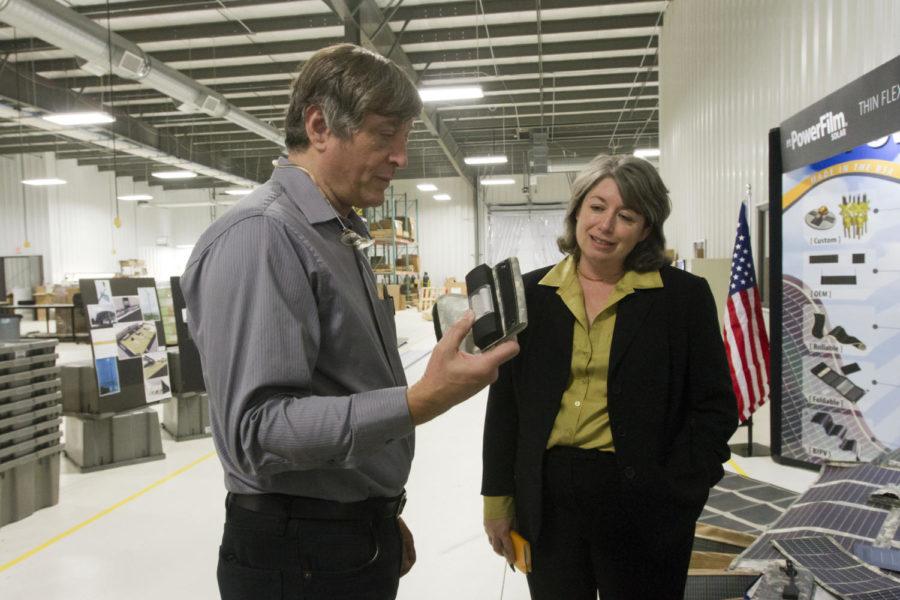U.S. Department of Defense gives local business $5.2 million to develop solar technology
Photo: Megan Wolff/Iowa State Da
Frank Jeffery, co-founder of PowerFilm, shows Sharon Burke, an assistant secretary of defense, a portable phone charger made by PowerFilm. The company manufactures flexible solar panels that have uses for both the military and civilians. The solar panels are designed to be sewn onto fabric that allows them to be folded or rolled up, saving both space and weight over traditional glass solar panels.
October 17, 2012
Ames was the destination of a government employee whose reason for visiting will result in new jobs and investments for Ames’ local business: PowerFilm Solar.
Sharon Burke, assistant secretary of defense for operational energy plans and programs, toured the PowerFilm Solar headquarters in Ames on Tuesday alongside Ann Campbell, mayor of Ames.
The purpose for Burke’s visit to Ames was to lessen the amount of government spending on fuel items such as gasoline and batteries.
In addition to having to send fewer fuel transports to troops and bases overseas, Burke hopes the efforts will put less lives at risk.
Appointed by President Barack Obama in 2010 to reduce the U.S. Armed Forces’ reliance on foreign fuels, Burke is responsible for the overall fuel policy.
As a part of overseeing these investments, Burke has been visiting numerous companies like PowerFilm to establish uses for their products and thank those that produce the equipment.
PowerFilm, a company started in 1988 by two former 3M employees, has received more than $20 million in research and development and procurement funds from the U.S. Department of Defense since 2000.
The business, specializing in all things having to do with solar panels and solar technology, manufactures its products in West Ames.
Announced Tuesday, the DOD will be giving $5.2 million more to PowerFilm for military-use solar panels and tents.
Chad West, PowerFilm’s marketing director, talked about the display set up in the facility’s second manufacturing building. There were examples of several products that the company builds.
The demonstrations included highly-flexible solar strips that, when unrolled, can charge a built-in battery pack that has a USB plug.
“The portability, ruggedness and quick charge time [four hours in sunlight] make it useful for any occasion where battery power for your device might be an issue,” West said.
The solar charge pack was among the smallest of items shown at the display.
Larger panels, such as ones made to sit atop golf carts, accompanied tent-like sheets of reinforced, weatherproof nylon with inlaid solar panels intended for large tents used (and purchased) by the U.S. Army and U.S. Marines.
PowerFilm takes pride in its products’ ability to conform to whatever use they’re needed for.
With flexible solar panels, products such as the battery charger can be folded up to fit into a jean pocket.
Tent solar panels can even be compacted to fit in a backpack.
Contributing to why Burke and the DOD are interested in its products, PowerFilm said these energy-acquisition revolutions will lessen government fuel spending and lighten soldiers’ packs by up to 30 pounds.
As an economic alternative to heavy batteries and barrels of fuel, flexible solar panels weigh much less and are far more portable.
After the introductory meeting and presentation, Burke and Frank Jeffrey, co-founder of PowerFilm, took a tour around the first manufacturing building on the company’s production site.
Explaining that the company builds using only machines they have designed and/or created themselves, Jeffrey emphasized how PowerFilms products and processes are different than other companies’ panels.
Pat Rundall, vice president of production, took Burke on a tour of the building where workers sat down and hand-assembled each solar panel product.
Thanking and engaging in conversation each worker she passed, Burke consistently praised the employees of PowerFilm for the work they were doing as Rundall explained each step of their process.
An emphasis on the durability and weather-proof construction of the company’s types of fabric was shown. Rundall explained that it is a combination of extreme flexibility with the power to take on any environment a user — military or civilian — might throw at it.
Impressed, Burke acknowledged the company’s strong feel for lasting products and their work to help the DOD.
At the conclusion of the tour, Burke thanked PowerFilm for the tour and announced the $5.2 million project that will create approximately 20 new jobs in Ames while lessening spending and danger for troops overseas.
“This takes fuel convoys out of the equation,” Burke said.
The solar panel technology will immediately be implemented with trained troops.







